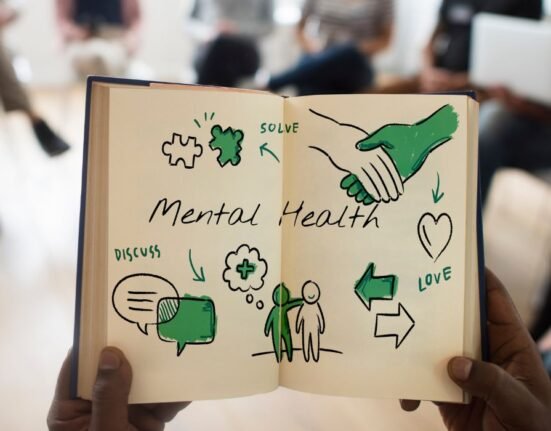Last year on World Mental Health Day, the World Health Organization decided theme: “Mental health is a universal human right”. This agenda has two main objectives:
1) To spread awareness of mental health around the world.
2) To mobilize efforts in support of mental health.
It’s really important to first understand the definition of mental health. According to WHO, “Mental Health is a state of mental well-being that enables people to cope with the stresses of life, realize their abilities, learn well and work well, and contribute to their community.” As per this definition, any person who has a sink between his thoughts, actions, and environment and is also able to function well in the main domains of life will be called mentally balanced.
This theme (mental health is a universal human right) explains that every person has a right to get all sorts of support in terms of mental health(social, emotional, financial, and medical) across the universe as it’s a basic need and right of each individual. Every person who is suffering from mental illness has a right to live with dignity and does not deserve any discrimination on the grounds of mental health illness.
The major problem in today’s scenario is when people disclose that they are facing mental illness or emotional disturbance they do not get equal opportunity in society most of the time. People who are suffering from mental illness can function well in society if they get proper support from family, society, and mental health centers.
Also Read: Thalamus: One of the Essential Parts of the Human Brain
The term mental hygiene was coined by Clifford Whittingham Beers. He was suffering from depression and paranoia in 1900. In his book, A Mind That Found Itself, an autobiographical account he wrote about his illness, hospitalization, and abuses he had to face. He founded the American Mental Health Movement. Later in life, he became Honorary President World Federation for Mental Health.
By giving his example, What I want to say is that the human mind is full of potential and people who are suffering from mental health illness can live a normal life and contribute to society if get proper care and support. With adequate support, the quality of life of people who are suffering from mental health illness will improve. They are already facing a battle within themselves, so why increase their problems by judging them and by being less supportive?

Also, people want to spend money on physical health, but when it comes to mental health illness they find it costly. Mental health is as important as physical health. In our nation, people are now talking more about mental health. Awareness can reduce the number of people who are suffering from mental health illnesses. Here I want to share a few ways that can help us be more healthy in terms of mental health by practicing it.
Things we can do to build better Mental Health
1) Optimistic Perception:
First of all, accept the fact that life is not smooth for anyone. Everyone is fighting there in battle. Then why some people are more balanced and settled than others? It’s only because they accept the fact that even though life is not smooth, they have the choice to do their best. Life challenges will change with time, but not end. They have hope for the future. They believe that their problem will increase in the future, so as their power to face them because of their past experience.
Also Read: Cerebral Cortex: The most important part of human brain
I know it’s not easy to be optimistic when you are facing challenges related to your life priorities, but with practice, you can reduce your helplessness and enhance your self-efficacy. In all religions when we pray we don’t ask God to solve our problems, what we ask is to give us more courage to face it. Without challenge, life will become boring as it was for Buddha. He got all the luxuries of life and that led him to renounce the world.
Buddha himself said that challenges are what makes life interesting and overcoming them is what makes life meaningful.
Without struggle, you will not have stories to tell to your children and grandchildren.
Because of Maya every time you will face problems in your life, you will forget optimism, but you have to keep practicing it until it does not come into your character. Practicing optimism will reduce the timing of your suffering day by day and you will be able to find meaning in every challenge you face in life.
2) Balance:
What we all want is a balanced life. For this, you don’t have to end Anger, Attachment, and Negative emotions. You have to create balance among them in such a way that it will become beneficial for you to feel it. For example- try to figure out what makes you angry the most. You will realize that you are unable to express your expectations or feelings and it makes you feel uncomfortable. Your subconscious mind shifts these feelings into anger.
People who are facing anger issues are the ones who find it difficult to express themselves. So the solution to this is to be more expressive. Yes, you will make mistakes and sometimes you might speak more than was required but that’s how we learn. This practice will lead to your self-improvement. One of the most important things is to stop saying, I can’t control my anger. By saying so you allow your mind and emotions to go out of hand. Say to yourself I can control my anger.
Also Read: The Onion Model: Understanding the Psychology of Human Personality
Whenever you experience negative emotions accept that it’s ok to feel bad, jealous, and miserable. But it’s not ok to keep feeling as if you are nourishing this negative emotion. Ask a few deductive questions to yourself to understand and balance your emotions:
- what is this bothering me so much?
- Can I bring hope in this situation?
- what disturbs my mood abruptly and what I can do to balance it?
- Am I employing a healthy perspective?
- Am I putting my honesty and enough effort into the result I want in my relationship?
- What do I need to change about myself?
As the law of attachment also says you attract what you feel. Try to be calm and with time you will enhance your patience and tolerance level. With practice, you will become better day by day in balancing emotions.
3) Be observant towards your inner narrative:

If we focus on our inner narrative we will realize that we are feeling negatively because either we are comparing ourselves with others thinking low about our capability or thinking too seriously about someone’s opinion. We all want everything in our life as planned if we don’t get it, we condemn ourselves, our destiny or our efforts. Repetition of this negative self-talk develops a sense of inferiority or low confidence and decreases our self-efficacy too.
Unconsciously the nature of our inner script will become negative and we will develop the habit of focusing on things we don’t have instead of what we have. This will decrease our level of gratitude severely and we will feel miserable in life. We have to change this cycle of negativity by practicing gratitude. Accepting the fact that everyone is facing some problem in their life, we are not the only ones.
Also Read: Cyberpsychology: The connection between human mind and technology
Ask yourself what you want in your life. What is your vision in your life? Write your script in the form of positive possibilities. Imagine yourself living that moment of joy. Work towards what best you can do to achieve it. The energy that you are putting on your fear channelizes it towards your dream life. In this way, we can change the nature of our unconscious script. Consciously talk positively to yourself until it becomes an integral part of your personality. Some suggestions on positive self-talk:
- I am ready for the challenge
- I believe in myself.
- I am my support system
4) Accepting your past:
We cannot change our past, what we can do is create a better present and add happy chapters to our past. The more we think about the past, the more difficult it becomes to focus on the present and observe the newness of that present situation. Accepting the past without blaming others can set us free.
We are who we are only because of our experience. With each experience we learn something and life is all about learning. Don’t be scared of suffering and pain. Too much pain tells us when to stop and suffering makes us grounded as humans. Nothing happens without reason. It’s essential to accept good or bad experiences in life. It will enhance our maturity and that’s how we all will grow.
5) Learn to difference between mental health concerns and daily life challenges:
There is a difference between daily life challenges and mental health concerns. Here I am mentioning some of the warning signs that indicate that you are facing some serious concerns:
- Prolonged or strong feelings of irritability or anger.
- Excessive feelings of sadness
- Extreme mood changes.
- Sudden change in personality. You avoid meeting friends and attending social gatherings that you have enjoyed before.
- Excessive Anxiety, Worry, Guilt and Fear.
- Change in eating and sleeping habits.
- Use of substances (alcohol or drugs) to cope with the situation.
- Confused thinking, unable to concentrate or learn, even though it is affecting your work and life.
If you are experiencing any of these feelings you must take a first step towards your mental health.
6) Concept of give and get:

Most of the time we get hurt because we did not get what we expected in return. You will act as per your experience and abilities and another person will act as per theirs. Sometimes when we do not get what we expect we blame ourselves for that. This happens most often in relationships. No two people have identical experiences and personalities. Accept that people are different, it will make your life easy. Act as per your capacity and expect less in return. Instead of judging practice accepting.
7) Boundaries are important:
knowing when to give up and stop is an art. If you are the constant giver in your relationship soon you will get exhausted and you might experience burnout. Learn to say no and get ready to be rejected also. You are interacting with humans and you will have differences, but if you are compromising on your priorities it will have a lasting impact on your mental health. Don’t go too far from your basic nature, if it is difficult for you to do, say no. If required give your reason, but don’t expect that person to understand it.
Also Read: The Onion Model: Understanding the Psychology of Human Personality
Balanced mental health is a journey, not a destination. Each day will bring some challenges that we have not experienced before and each time we have to find some way to cope with it. That’s how life will continue. If you have the spirit of understanding everything positively, you will enjoy every moment of life, whether it is pressure or pleasure.













Leave feedback about this